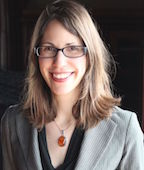The Music History and Theory Study Group Presents:
Abigail Fine
University of Chicago
Beethoven’s Shroud, Mozart’s Shrine: Composer-Saints and Their Followers (1870-1930)
Wednesday, January 18, 2017
Logan 028
For this study group, I will deliver a mock job talk that offers a “highlights reel” of my research (an alternate format specially requested by my interviewers). The work I’ll present offers synopses and snapshots from my dissertation, which argues that material practices of composer-veneration—namely the sanctification of composers’ bodily remains as relics and their houses as shrines—served as a powerful cultural force that shaped understandings of these composers’ music. It was common in the nineteenth century to cherish locks of hair or autograph manuscripts as relics, to visit birth- and death-sites on pilgrimage, and to idealize pathology as if artists were suffering saints. While scholarship in musicology has made casual references to composers as saints and hagiographic biographies, the discipline has tended to dismiss these popular practices as ephemera on the fringes of music history. I argue that these practices in fact expose an important tension that characterized middle-class music culture: the same listeners who idealized music as absolute found themselves fascinated by traces of the composer’s body, a form of secular object-fetishism that was expressed with the vocabulary of Catholicism. My case studies on the relics and museums of Beethoven and Mozart reveal that spiritual sound and material bodies served essentially the same function: both were tickets into literate society for a German middle class that defined itself by Bildung (upward mobility through education). And while many educated listeners touted their superiority to the kitsch-loving petit bourgeoisie, their reception of music was nonetheless shaped by material culture, with examples ranging from Beethoven’s face mask (which encouraged physiognomic readings of his music) to Mozart’s hallowed workspaces (which amplified the sacred aura of the works created there).
Persons who believe they may require accommodations to participate fully in this event should contact the coordinator, Bradley Spiers at spiersb@uchicago.edu, in advance.
